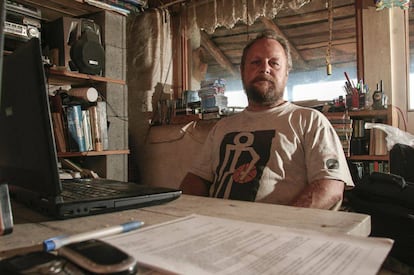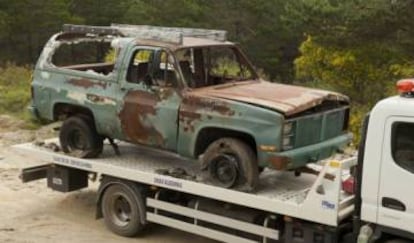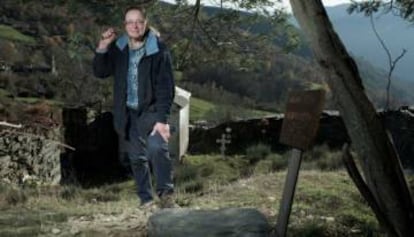Case of murdered Dutchman goes to trial in northern Spain’s “Wild West”
Prosecutor is accusing two brothers of the murder of Martin Verfondern in a remote Galician hamlet


“There are places and then there are places, and Santoalla, at the far end of Galicia, is a world unto itself. Santoalla was the Wild West.”
This description was provided on Monday morning by the prosecuting attorney, Miguel Ángel Ruiz, as he addressed a jury of six women and three men inside the Provincial Court of Ourense, in northwestern Spain, at the trial of the murder of Martin Verfondern, also known as “The Dutchman of Petín.”
I could see that this [his death] was going to happen to him at any time, because he picked on people even if they hadn’t done anything to him
Julio Rodríguez
At the first hearing in the case against the brothers Juan Carlos and Julio Rodríguez, who are accused of the killing, what emerged is that a perfect crime sometimes depends not so much on great planning as on circumstance.
The jury heard testimony from Julio, the oldest of the siblings and the only one who agreed to take the stand. He faces 18 years in prison if the prosecution can prove that he planned the murder with his brother Juan Carlos.
But Julio Rodríguez denies having shot his neighbor on January 19, 2010. Instead, he claims that he found the body, and decided to hide it “out of fear” that “he might have run into trouble with a member of my family.”
“It didn’t occur to you to call the Civil Guard or an ambulance?” asked the prosecution.

“No it didn’t... I thought, ‘I need to get him out of here’.”
His brother Juan Carlos, who has an accredited intellectual disability, is believed to be the one who pulled the trigger of the rifle that killed Verfondern as the latter was driving back from a Lidl supermarket in a nearby town. He faces 17 years in prison for murder and illegal possession of firearms, with the extenuating circumstance of his disability.
There were only 10 days left to go before Martin Verfondern’s 52nd birthday, and only 40 days had passed since a court had found that he and his wife Margo had rights over common land in the mountain surrounding the hamlet of Santoalla. These rights were the subject of a bitter dispute between Verfondern and the Rodríguez family, the only other residents of Santoalla.
A German-born, naturalized Dutch citizen, Martin Verfondern had moved to the tiny community from the Netherlands in the 1990s with his wife, Margo Pool, where they set up an organic farm. He initially made friends with the only other year-round residents of the hamlet, the Rodríguez family, who run a farm. But over the years, he gradually fell out with his neighbors.
Things came to a head when the outsiders discovered that they had as many rights as the locals to the profits derived from the mountain
Talking to EL PAÍS just months before his disappearance, Martin Verfondern said he never left his house without a video camera “on standby.” He reportedly came to blows with the family patriarch, Manuel Rodríguez, on several occasions.
January 19, 2010 was a cold and foggy day, the accused recalled in court. Julio Rodríguez told the court that he happened to see the victim’s car with the body slumped in the driver’s seat as he drove his own tractor through town with fodder for the cows.
Then his brother Juan Carlos happened to come along, and they both moved the corpse to the passenger seat. Julio then got in and drove the victim’s car into the mountains, covering 18 kilometers down dirt roads lined with snow until he reached a remote pine grove in As Touzas da Azoreira. There, “smoke began to come out of the car.”
Julio said he pulled out the body, covered it with pine branches and set it on fire. Meanwhile, the Chevrolet Blazer “went up in flames by itself.” Civil Guard investigators believe that he tried to set the vehicle on fire too, but that the snow hindered the process.

Julio then walked all the way back, kept quiet about what he had done throughout the four-and-a-half years that people searched for Martin Verfondern, and even kept buying meat from the victim’s widow. At one point he told her that her husband might have “run off with another woman” because he had lately been seen “with a blonde.”
This possibility – betrayal by her spouse after leaving her job in Amsterdam, and following him to this remote part of the world – would make Pool cry, even though she was not given to public displays of emotion.
The prosecutor says that Julio Rodríguez selected “a perfect place, really ideal” to hide the body. Hundreds of people, dogs, helicopters and boats had participated in the search operation, which included the nearby reservoirs. But there were no leads until June 2014, when a Civil Guard helicopter performing firefighting duties had a technical problem and made an unplanned landing in the area. Its occupants noticed a metallic glint in the deserted pine grove. It was the remains of the Chevrolet.
In his first statements following his arrest in December 2014, Juan Carlos admitted that he had shot his neighbor because he was “driving like a madman.” But his defense lawyer Sonia Jiménez denies that her client was involved in the death, or that there was any planning to kill him at all.
If the court finds that Juan Carlos pulled the trigger on the spur of the moment and that Julio hid the body to cover up for his brother, Julio would get off “scot-free,” warned the prosecutor, because of the extenuating circumstance of first-grade kinship combined with the lack of planning.
In court, Julio said he did not believe his brother capable of shooting anyone, and that Juan Carlos initially said he had done it “to make himself important” and “to act like a hero,” given that Verfondern was allegedly a violent man who “scared” the family patriarch.
“He is prone to fantasizing and he has the mind of a seven-year-old,” said the defense lawyer, insisting that he would be incapable of hatching a plan with his brother and following through on it.
Martin and Margo Verfondern arrived in Santoalla in 1997 to get a fresh start in life. At first, relations with the locals were “perfect,” said Julio Rodríguez. His own father helped the new arrivals find a suitable house to buy among all the homes left empty by mass emigration to the city.
The accusation painted a picture of growing friction and cultural clashes against the backdrop of this rural, deserted spot in Galicia. Things came to a head when the outsiders discovered that they had as many rights as the locals to the profits derived from the mountain, such as the sale of wood. At stake was dividing these profits by half, said the prosecutor: “Going from 100% of potential earnings to 50%.” Verfondern’s widow has recently received €10,000 from the sale of wood from local trees.
“If I had known that he was dead, I wouldn’t have gone up to the village,” said Julio in court. “I could see that this [his death] was going to happen to him at any time, because he picked on people even if they hadn’t done anything to him.”
English version by Susana Urra.
Tu suscripción se está usando en otro dispositivo
¿Quieres añadir otro usuario a tu suscripción?
Si continúas leyendo en este dispositivo, no se podrá leer en el otro.
FlechaTu suscripción se está usando en otro dispositivo y solo puedes acceder a EL PAÍS desde un dispositivo a la vez.
Si quieres compartir tu cuenta, cambia tu suscripción a la modalidad Premium, así podrás añadir otro usuario. Cada uno accederá con su propia cuenta de email, lo que os permitirá personalizar vuestra experiencia en EL PAÍS.
¿Tienes una suscripción de empresa? Accede aquí para contratar más cuentas.
En el caso de no saber quién está usando tu cuenta, te recomendamos cambiar tu contraseña aquí.
Si decides continuar compartiendo tu cuenta, este mensaje se mostrará en tu dispositivo y en el de la otra persona que está usando tu cuenta de forma indefinida, afectando a tu experiencia de lectura. Puedes consultar aquí los términos y condiciones de la suscripción digital.








































